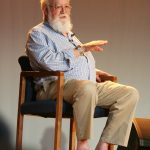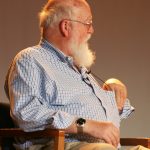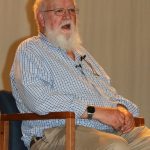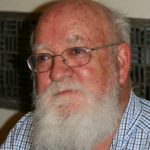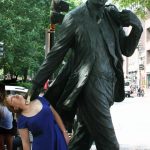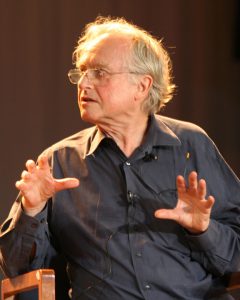 I got to see noted scientist, atheist and author Richard Dawkins and philosopher/author Daniel Dennett in Boston this past Thursday, June 11. I first saw Dawkins at the Reason Rally in Washington DC, so this was my second eyes-on viewing of him, but it was my first time seeing Dennett in person. I traveled down with three members of the Capital Region Atheists & Agnostics — Lizz Lloyd, Jim Piren and Ken Spencer. (A big thank-you to them for the company and the wheels.)
I got to see noted scientist, atheist and author Richard Dawkins and philosopher/author Daniel Dennett in Boston this past Thursday, June 11. I first saw Dawkins at the Reason Rally in Washington DC, so this was my second eyes-on viewing of him, but it was my first time seeing Dennett in person. I traveled down with three members of the Capital Region Atheists & Agnostics — Lizz Lloyd, Jim Piren and Ken Spencer. (A big thank-you to them for the company and the wheels.)
The format of the event, held in Boston’s Chevalier Theatre and the third of a 3-city tour featuring Dawkins and different co-speakers, was a fireside chat — a rambling, amiable hourlong talk between Dennett and Dawkins, followed by an hour of Q&A, then a book signing in the lobby.
The thoughtful talk covered mostly science-related issues, only dipping into atheism and freethought near its end.
Dennett spoke at length about The Clergy Project. He and fellow researcher Linda LaScola interviewed numerous clergymen who no longer believed, yet were still working in their field – mostly because they were unemployable anywhere else – and produced a study published as Caught in The Pulpit: Leaving Belief Behind. Though the two researchers were careful to maintain the anonymity of respondents, some of the clergy members interviewed found each other and founded The Clergy Project, which now, Dennett said, has more than 600 core members – working clergy who are nevertheless atheists.
One questioner asked Dennett about plans for including some sort of safe house for women attempting to escape fundamentalist groups and families. Dennett admitted that The Clergy Project contained nothing of the sort at present, but he thought it a good idea.
Dawkins at one point during the Q&A said something surprising. The question was “Should atheists work with moderate Christians and churches to oppose fundamentalists?” The main part of his answer was that a team-up with moderate Christians could certainly be useful in certain circumstances, but he wasn’t in favor of it as a main strategy. He followed up by saying his primary concern at present is Islam, and added he had a quiet worry that “dismantling Christianity” might eliminate a powerful ally in opposing Islam.
A couple of beefs on my part:
First, the sound system in the theatre was subpar. Ear-piercing feedback squealed out into the auditorium for many minutes – and randomly throughout the talk – visibly annoying both Dawkins and Dennett, who soldiered on as well as possible. Dawkins even got out of his chair more than once to tinker with an on-stage speaker box. I have to wonder how it’s even possible to have such amazingly bad sound in an old, established auditorium.
Second, the ladies handing around the mikes during the audience Q&A session ignored me. I waved my hand in the air a LOT during the Q&A hour, and I watched the nearest mike-carrier’s eyes slide away from me several times. True, I was there wearing my cowboy hat, and I suspect she thought I was there to cause a scene, and didn’t want to give me the chance. (I DID consider making a joke by saying in my Deep South accent “If human bein’s came from monkeys …” before asking my real question. Ah well.)
With close to a thousand people attending, a LONG line developed for the book signings at the end. Dawkin’s final comment after the Q&A was to ask the people at the beginning of the line to be generous with the time of those at the end, and suggested no selfies, to general laughter.
Dawkins and Dennett sat approachably at a small table, and signed book after book, hundreds of them. This time I did get to make a joke, by first handing Dawkins The God Delusion to sign, then giving him a copy of Red Neck, Blue Collar, Atheist, explaining quickly that it was my own book, and that the bull rider on the cover was me. I’m pretty sure nothing like that had ever happened to him – he looked momentarily baffled as he examined it, then smiled big and graciously thanked me.
In the end, I got to personally thank both Dawkins and Dennett: “Thank you for existing! And for all you do.”
Dawkins:
Dennett:
Boston Scenes:





